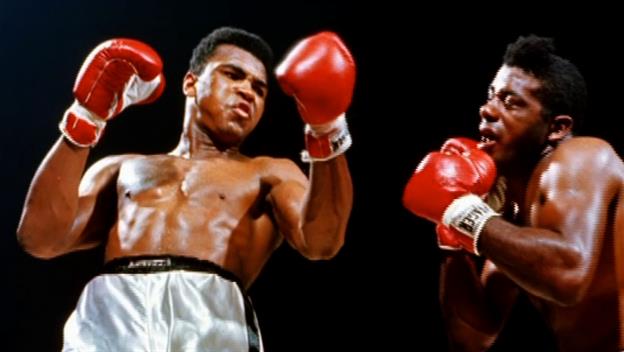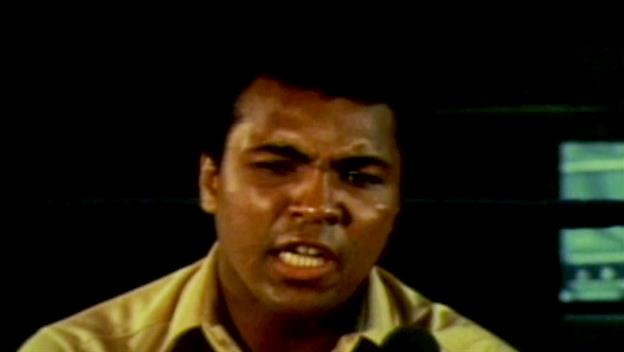Muhammad Ali, original name
Cassius Marcellus Clay, Jr. (born
January 17, 1942,
Louisville,
Kentucky, U.S.), American professional boxer and social activist. Ali was the first fighter to win the world
heavyweight championship on three separate occasions; he successfully defended this title 19 times.
Cassius
Marcellus Clay, Jr., grew up in the American South in a time of
segregated public facilities. His father, Cassius Marcellus Clay, Sr.,
supported a wife and two sons by painting billboards and signs. His
mother, Odessa Grady Clay, worked as a household domestic.
When Clay was 12 years old, he took up
boxing
under the tutelage of Louisville policeman Joe Martin. After advancing
through the amateur ranks, he won a gold medal in the 175-pound division
at the 1960
Olympic Games in
Rome
and began a professional career under the guidance of the Louisville
Sponsoring Group, a syndicate composed of 11 wealthy white men.
In
his early bouts as a professional, Clay was more highly regarded for
his charm and personality than for his ring skills. He sought to raise
public interest in his fights by reading childlike poetry and spouting
self-descriptive phrases such as “float like a butterfly, sting like a
bee.” He told the world that he was “the Greatest,” but the hard
realities of boxing seemed to indicate otherwise. Clay infuriated
devotees of the sport as much as he impressed them. He held his hands
unconventionally low, backed away from punches rather than bobbing and
weaving out of danger, and appeared to lack true knockout power. The
opponents he was besting were a mixture of veterans who were long past
their prime and fighters who had never been more than mediocre. Thus,
purists cringed when Clay predicted the round in which he intended to
knock out an opponent, and they grimaced when he did so and bragged
about each new conquest.
![Ali, Muhammad: statistics, 1964 [Credit: Bettmann/Corbis]](http://media-2.web.britannica.com/eb-media/83/96283-004-7F5C8782.jpg.pagespeed.ce.W8RDTdwc70.jpg)
On February 25, 1964, Clay challenged
Sonny Liston
for the heavyweight championship of the world. Liston was widely
regarded as the most intimidating, powerful fighter of his era. Clay was
a decided underdog. But in one of the most stunning upsets in
sports
history, Liston retired to his corner after six rounds, and Clay became
the new champion. Two days later Clay shocked the boxing establishment
again by announcing that he had accepted the teachings of the
Nation of Islam. On March 6, 1964, he took the name
Muhammad Ali, which was given to him by his spiritual mentor,
Elijah Muhammad.
![Terrell, Ernie [Credit: UPI/Bettmann Archive]](http://media-2.web.britannica.com/eb-media/88/361x450x5488-004-9637370D.jpg.pagespeed.ic.nbugH4iqtF.jpg)
For
the next three years, Ali dominated boxing as thoroughly and
magnificently as any fighter ever had. In a May 25, 1965, rematch
against Liston, he emerged with a first-round knockout victory.
Triumphs
over
Floyd Patterson,
George Chuvalo, Henry Cooper, Brian
London, and Karl Mildenberger followed. On November 14, 1966, Ali fought
Cleveland
Williams. Over the course of three rounds, Ali landed more than 100
punches, scored four knockdowns, and was hit a total of three times.
Ali’s triumph over Williams was succeeded by victories over
Ernie Terrell and Zora Folley.
Then, on April 28, 1967, citing his religious beliefs, Ali refused induction into the U.S. Army at the height of the
war in Vietnam.
This refusal followed a blunt statement voiced by Ali 14 months
earlier: “I ain’t got no quarrel with them Vietcong.” Many Americans
vehemently condemned Ali’s stand. It came at a time when most people in
the
United States
still supported the war in Southeast Asia. Moreover, although
exemptions from military service on religious grounds were available to
qualifying conscientious objectors who were opposed to war in any form,
Ali was not eligible for such an exemption, because he acknowledged that
he would be willing to participate in an Islamic holy war.
Ali
was stripped of his championship and precluded from fighting by every
state athletic commission in the United States for three and a half
years. In addition, he was criminally indicted and, on June 20, 1967,
convicted of refusing induction into the U.S. armed forces and sentenced
to five years in prison. Although he remained free on bail, four years
passed before his conviction was unanimously overturned by the
U.S. Supreme Court on a narrow procedural ground.
Meanwhile,
as the 1960s grew more tumultuous, Ali’s impact upon American society
was growing, and he became a lightning rod for dissent. Ali’s message of
black pride and black resistance to white domination was on the cutting
edge of the
civil rights movement.
Having refused induction into the U.S. Army, he also stood for the
proposition that “unless you have a very good reason to kill, war is
wrong.” As black activist
Julian Bond
later observed, “When a figure as heroic and beloved as Muhammad Ali
stood up and said, ‘No, I won’t go,’ it reverberated through the whole
society.”
In October 1970, Ali was allowed to return to boxing,
but his skills had eroded. The legs that had allowed him to “dance” for
15 rounds without stopping no longer carried him as surely around the
ring. His reflexes, while still superb, were no longer as fast as they
had once been. Ali prevailed in his first two comeback fights, against
Jerry Quarry and Oscar Bonavena. Then, on March 8, 1971, he challenged
Joe Frazier,
who had become heavyweight champion during Ali’s absence from the ring.
It was a fight of historic proportions, billed as the “Fight of the
Century.” Frazier won a unanimous 15-round decision.
Following his
loss to Frazier, Ali won 10 fights in a row, 8 of them against
world-class opponents. Then, on March 31, 1973, a little-known fighter
named
Ken Norton
broke Ali’s jaw in the second round en route to a 12-round upset
decision. Ali defeated Norton in a rematch. After that he fought
Joe Frazier
a second time and won a unanimous 12-round decision. From a technical
point of view, the second Ali-Frazier bout was probably Ali’s best
performance in the ring after his exile from boxing.
On October 30, 1974, Ali challenged
George Foreman, who had dethroned Frazier in 1973 to become heavyweight champion of the world. The bout (which Ali referred to as the “
Rumble in the Jungle”)
took place in the unlikely location of Zaire (now the Democratic
Republic of the Congo). Ali was received by the people of Zaire as a
conquering hero, and he did his part by knocking out Foreman in the
eighth round to regain the heavyweight title. It was in this fight that
Ali employed a strategy once used by former boxing great
Archie Moore. Moore called the maneuver “the turtle” but Ali called it “
rope-a-dope.”
The strategy was that, instead of moving around the ring, Ali chose to
fight for extended periods of time leaning back into the ropes in order
to avoid many of Foreman’s heaviest blows.
Over the next 30
months, at the peak of his popularity as champion, Ali fought nine times
in bouts that showed him to be a courageous fighter but a fighter on
the decline. The most notable of these bouts occurred on October 1,
1975, when Ali and Joe Frazier met in the
Philippines,
6 miles (9.5 km) outside Manila, to do battle for the third time. In
what is regarded by many as the greatest prizefight of all time (the “
Thrilla in Manila”), Ali was declared the victor when Frazier’s corner called a halt to the bout after 14 brutal rounds.
The final performances of Ali’s ring career were sad to behold. In 1978 he lost his title to
Leon Spinks,
a novice boxer with an Olympic gold medal but only seven professional
fights to his credit. Seven months later Ali regained the championship
with a 15-round victory over Spinks. Then he retired from boxing, but
two years later he made an ill-advised comeback and suffered a horrible
beating at the hands of
Larry Holmes in a bout that was stopped after 11 rounds. The final ring contest of Ali’s career was a loss by decision to
Trevor Berbick in 1981.
Ali’s
place in boxing history as one of the greatest fighters ever is secure.
His final record of 56 wins and 5 losses with 37 knockouts has been
matched by others, but the quality of his opponents and the manner in
which he dominated during his prime placed him on a plateau with
boxing’s immortals. Ali’s most-tangible ring assets were speed, superb
footwork, and the ability to take a punch. But perhaps more important,
he had courage and all the other intangibles that go into making a great
fighter.
Ali’s later years were marked by physical decline.
Damage to his brain caused by blows to the head resulted in slurred
speech, slowed movement, and other symptoms of
Parkinson syndrome. However, his condition differed from
chronic encephalopathy,
or dementia pugilistica (which is commonly referred to as “punch drunk”
in fighters), in that he did not suffer from injury-induced
intellectual deficits.
Ali’s religious views also evolved over time. In the mid-1970s he began to study the Qurʾan seriously and turned to Orthodox
Islam. His earlier adherence to the teachings of
Elijah Muhammad
(e.g., that white people are “devils” and there is no heaven or hell)
were replaced by a spiritual embrace of all people and preparation for
his own afterlife. In 1984 Ali spoke out publicly against the separatist
doctrine of
Louis Farrakhan,
declaring, “What he teaches is not at all what we believe in. He
represents the time of our struggle in the dark and a time of confusion
in us, and we don’t want to be associated with that at all.”
Ali
married his fourth wife, Lonnie (née Yolanda Williams), in 1986. He had
nine children, most of whom avoided the spotlight of which Ali was so
fond. One of his daughters, however,
Laila
Ali, pursued a career as a professional boxer. While her skills were
limited, she benefited from the fact that the Ali name was still
financially viable.
In 1996 Ali was chosen to light the Olympic flame at the start of the Games of the
XXVI Olympiad in
Atlanta,
Georgia.
The outpouring of goodwill that accompanied his appearance confirmed
his status as one of the most-beloved athletes in the world. His life
story is told in the
documentary film I Am Ali (2014), which includes audio recordings that he made throughout his career and interviews with his intimates.
 The late Muhammad Ali was more than a legendary boxer, he was a world champion for equality and peace, UN Secretary-General has said.
The late Muhammad Ali was more than a legendary boxer, he was a world champion for equality and peace, UN Secretary-General has said.![Jinnah, Mohammed Ali [Credit: Bettmann/Corbis]](http://media-2.web.britannica.com/eb-media/75/75575-004-9224CA3C.jpg)
![India and Pakistan: independence [Credit: Stock footage courtesy The WPA Film Library]](http://media-2.web.britannica.com/eb-media/62/128962-049-589879B4.jpg.pagespeed.ce.9Mzd6fjIgj.jpg)
![tomb of Mohammed Ali Jinnah [Credit: Alan Johnson/Heritage-Images]](http://media-2.web.britannica.com/eb-media/45/550x359x100345-004-7596059D.jpg.pagespeed.ic.XRtq_I-bra.jpg)
![Ali, Muhammad: statistics, 1964 [Credit: Bettmann/Corbis]](http://media-2.web.britannica.com/eb-media/83/96283-004-7F5C8782.jpg.pagespeed.ce.W8RDTdwc70.jpg)
![Terrell, Ernie [Credit: UPI/Bettmann Archive]](http://media-2.web.britannica.com/eb-media/88/361x450x5488-004-9637370D.jpg.pagespeed.ic.nbugH4iqtF.jpg)



